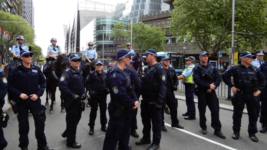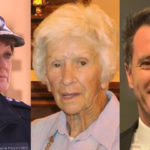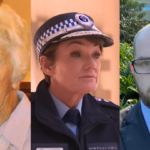NSW Police Inquiry Finds that Sending Officers to Mental Health Incidents Escalates Them

In the wake of an internal review, the NSW Police Force last Thursday released a summary of findings regarding its officers continuing to be called upon as first responders to mental health incidents, and the agency is clear in stating that the current model is problematic.
The key recommendation is that the NSWPF works with NSW Health to develop a new model that would see mental health responders being dispatched to appropriate cases, as in many circumstances sending police in only escalates situations and causes adverse outcomes.
The recent NSW parliamentary inquiry into mental health access came to a similar understanding, when in June, it called for reconsideration of the NSW police response to mental health emergencies so that it is “secondary” in nature.
And the NSW government said it supports this reform in principle three months later.
Police being relied upon as first responders to mental health crises is a yearslong issue, which came to a head last year, when an officer fatally tasered a 95-year-old grandmother in May and by last January, with the death of Nowra’s Andrew Pinnock, the toll had risen to five civilian deaths.
In the summary of its internal review, NSW police stresses that its findings are “not intended to represent NSW government policy”. But the report does reveal a law enforcement agency that’s calling on government to facilitate the creation a new system for dealing with mental health crises.
“An escalating factor”
“Using police officers as the primary response to mental health crisis increases the risk of adverse outcomes for mental health consumers, limits appropriate service engagement and treatment, and increases missed opportunities to address consumer mental ill health,” the report makes clear.
“In these cases, the involvement of law enforcement is often perceived as a threat, an authoritarian response and an escalating factor,” the NSWPF continues, adding that the majority of incidents officers are called upon to respond to don’t involve any crime, threat of violence or any weapons.
Police are currently being called out to a mental health incidents every 9 minutes, the report reveals and adds that in 2022, this resulted in police being called out to 61,164 mental health incidents involving no criminal behaviour, and this has been increasing at about 10 percent a year since 2018.
According to the NSWPF, mental health issues are increasing in general in NSW, which is leading to rising demand for responders called out to people in distress and this spike in need is not isolated, but is further happening in all states and territories, as well as globally, in other countries.
“The mere presence of the police uniform, firearms, lights and sirens can potentially escalate the situation, intimidate mental health consumers, and increase the potential of adverse outcomes,” the report states, adding that having officers at incidents causes distress and increases the risk of injury.
Not the role of police
The NSW state law enforcement agency then points out that NSW Health is the first responder to mental health crises, and each NSW health district has a mobile Acute Care Team. And it is when ambulances and mental health services aren’t available that police officers are called upon.
The report then underscores that police being called out to deal with mental health episodes in replacement of health services is more prominent an issue in rural and regional NSW.
And it adds that the NSWPF, NSW Health and Ambulance NSW have developed a Memorandum of Understanding on how to deal with mental health crises, which provides an overarching framework on how this should occur.
NSW police has a Mental Health Intervention Team that provides specialist training on how to manage people in crises in the field. And it provides training on how to identify such behaviour, speak to people in such conditions and deescalate these situations.
Section 6 of the Police Act 1990 (NSW) provides that the mission of police is to “work with community to reduce violence, crime and fear”, and the report highlights that sending officers out to deal with people suffering a mental health episode is often at odds with this mission.
The NSWPF further raises section 22 of the Mental Health Act (NSW), which provides police with the power to detain people having mental health crises. And it clearly defines that officers only intervene at the point when someone has committed a crime or is attempting to kill themselves.
However, the law does confer much greater powers upon ambulance operators, medical practitioners and mental health clinicians. And the review adds that regardless of how much extra training police receive, they’ll never match the level of expertise of mental health professionals.
Sending out the experts
The summary of the internal review outlines that versions of alternative deployment models are operating elsewhere and have operated in NSW in the past. But locally there has never been a statewide mental health service or another agency on call 24/7 besides the NSWPF.
NSW police and NSW Health have operated the PACER (Police, Ambulance and Clinical Early Response) program, which involves mental health clinicians responding to such incidents alongside NSW police officers, yet this only occurs at 16 of 57 Police Area Commands.
Special mention is also made of the Triple 1 phone line option now available in the UK, as part of its Right Care, Right Person (RCRP) initiative, which allows members of the community to call a specific number for mental health crises rather than first calling the police.
The RCRP model was implemented widely in the UK last year. Although, it had been developed on the ground by Humberside police, when that police department made the decision to concentrate on core policing duties and leave mental health to the professionals, when it suffered staff cuts in 2019.
And thresholds have been established under RCRP in regard to when police officers should be sent out to deal with incidents, which is either to investigate a crime or to protect a person, whether that be in regard to a risk to their life or of self-harm.
Since November last year, the Metropolitan Police in Greater London commenced operating under RCRP, which means many of the incidents that used to be considered its responsibility are now being dealt with by mental health experts.
The NSW police report concludes that whilst many mental health initiatives have been established in the community, the rise in mental health incidents requires a change in approach, and it recommends that the NSWPF and NSW Health collaborates on an alternative along the lines of RCRP.







